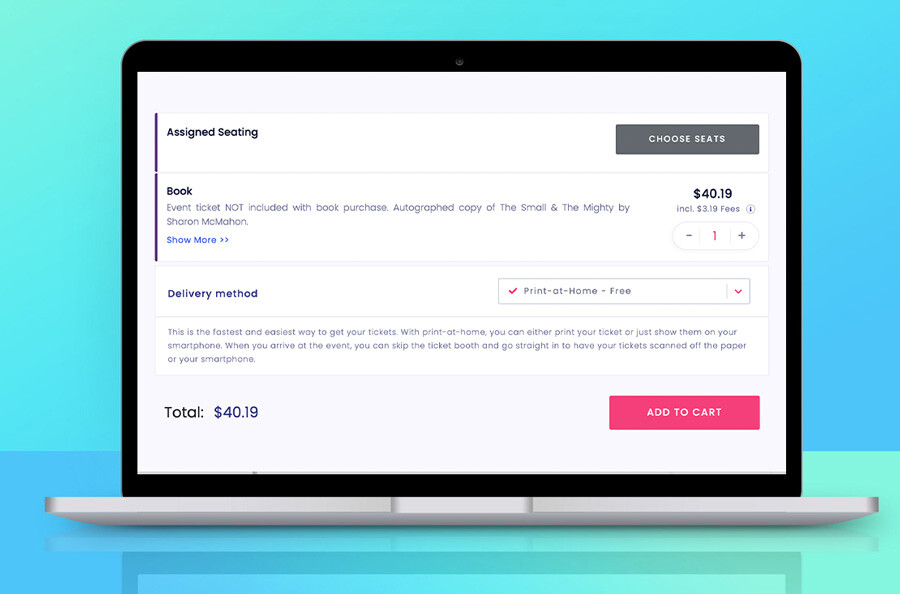Leveraging Ticketing Software to Streamline Your Book Tour
In today's digital age, planning and managing a book tour requires more than just traditional marketing and event planning skills—it demands an understanding of how to effectively use modern tools like ticketing software.
This versatile tool can significantly streamline operations, from selling tickets and managing seating to handling merchandise sales. Here’s how you can make the most out of ticketing software for your traveling book tour.
Recurring and Multiple Events Feature
For authors on tour, each stop involves setting up a new event, which can be time-consuming. Ticketing software offers the ability to create recurring and multiple events within a single platform.
This feature allows you to set up all your tour dates at once, adjusting only the specific details for each location. Whether it’s a nationwide tour or a series of regional stops, you can easily manage multiple dates, ensuring consistency in how each event is presented and handled.
Boost Revenue through Integrated Merchandise Sales
A significant benefit of using ticketing software is the ability to sell merchandise directly through the ticket purchasing process. This integration means that as fans buy tickets or RSVP, they also have the opportunity to purchase your book, branded merchandise, or special packages right at checkout.
This not only provides convenience for your audience but also increases your revenue per customer, making it easier to manage inventory and forecast demand for your merchandise.
Enhance Attendee Experience with Assigned Seating
If your book tour includes readings or special events where seating is crucial, ticketing software can handle this seamlessly. Offering assigned seating options provides a more organized event structure and improves the attendee experience.
Guests can choose their preferred seats at the time of purchase, reducing confusion and enhancing comfort during the event. This feature is particularly beneficial for high-demand events, ensuring that all attendees have the best possible experience.
Increase Discoverability and Reach with SEO-Enhanced Listings
An often-overlooked advantage of ticketing software is its ability to make your events more discoverable online. By using platforms with built-in search engine optimization (SEO) features, your event listings can rank higher in search results. This visibility is crucial for reaching a broader audience and attracting more attendees.
Moreover, the software can generate searchable event links that you can easily share across social media, email newsletters, and other marketing channels, further increasing your event’s reach.
Utilize Data Analytics for Targeted Marketing
Most advanced ticketing platforms offer robust analytics tools that help you understand your audience better. Use these insights to tailor your marketing efforts more precisely. Analyze data such as ticket sales by location, time, and demographic information to optimize your advertising campaigns and promotional strategies.
This data can also help you identify which locations are performing well and which may need more marketing attention.
Leverage Early-Bird and Tiered Pricing Strategies
To generate early interest and secure funding upfront, consider implementing early-bird pricing for your book tour stops. This strategy encourages fans to purchase tickets early, ensuring a baseline audience and helping to gauge interest in different locations.
As the event date approaches, you can adjust pricing based on remaining seat availability and demand. Tiered pricing can also incentivize purchases by offering different levels of access or perks at varying price points.
Offer Exclusive Pre-Order Bonuses
Connect your book sales with your ticketing by offering exclusive bonuses for pre-orders. For example, provide signed copies, limited edition covers, or bonus content as an incentive for ordering the book in advance through your ticketing platform.
This not only boosts book sales but also adds a special value that can be exclusive to your tour attendees, enhancing their overall experience.
Implement Cross-Promotion with Local Businesses
Partner with local businesses at each tour stop to cross-promote your event.
Bookstores, cafes, and cultural centers can help publicize your readings and signings, potentially offering package deals that include meals, discounts, or other local experiences along with the event ticket. This not only broadens your audience but also embeds your tour more deeply into the local community, making each stop more of an event.
Use Automated Email Campaigns for Follow-Up and Feedback
Set up automated email campaigns through your ticketing software to send follow-up messages to attendees after each event. Thank these attendees for their presence and invite them to leave feedback or a review of the event.
You can also use these emails to promote upcoming dates on your tour or offer exclusive content as a thank-you for their attendance, such as access to an online Q&A or a downloadable chapter of another book.
|
Building Recurring Events Made Easy! Set up the event you need in minutes! From book |
Prepare for Contingencies with Flexible Ticketing Options
Ensure your ticketing software allows for easy changes to ticket holder information and flexible refund policies. Life happens, and some attendees may need to change their plans. Offering the option to refund or transfer tickets easily can significantly enhance customer satisfaction and loyalty. It's also wise to prepare for potential disruptions, especially in today’s uncertain climate, by having clear policies and communication strategies in place.
These added tips provide a comprehensive approach to using ticketing software for book tours, ensuring not only streamlined event management but also enhanced engagement and satisfaction for your audience.
With these strategies, you can create a memorable and smooth-running book tour that maximizes both reach and impact.






